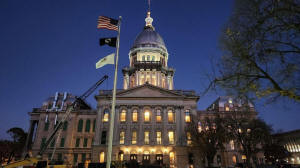|
Pew Charitable Trusts found only two states with annual deficits
in fiscal year 2022, a record low. Senior associate Page Forrest
said Illinois is one of just six states that recorded a 15-year
shortfall at the end of fiscal 2022.
“The good news is that fiscal year ‘22 is the first time in at
least two decades that Illinois recorded an annual surplus,”
said Forrest. “The bad news is that the surplus, while
substantial, wasn't enough to move the needle for the state long
term.”
The report notes that because of chronic deficits, Illinois
lawmakers regularly delayed payments to hundreds of vendors for
more than a decade. This only made the problem worse, with the
backlog peaking at $17 billion in 2017 because Illinois pays up
to 12% annual interest on unpaid bills.
At the beginning of the pandemic, the federal government quickly
approved financial support to states facing a slump in tax
collections and a spike in spending demands. But despite the
additional federal funds, 19 states, including Illinois, closed
fiscal 2020 with an annual deficit, the most states since the
Great Recession.
In 2021-2022, there was a quick recovery with massive surpluses
across the country.
“Several states benefited from the revenue wave, including
Illinois, and this wave was characterized by huge surges in tax
revenue as well as an increase in federal funds,” said Forrest.
Pew said that states can withstand periodic deficits without
endangering their fiscal health over the long run, but chronic
shortfalls are one indication of a more entrenched structural
deficit in which, without policy action to correct the
imbalance, revenue will continue to fall short of spending.
Nationally, state tax revenue rose 1.8% in the fourth quarter of
2023, but if you exclude California, state tax collections
continued to fall. As a result, the fourth quarter saw an
increasing number of states underperforming their long-term
trends.

|
|




